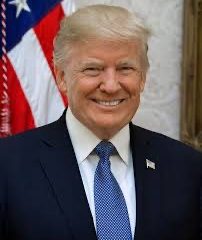AFRICA FOCUS
AU Raises Concerns Over Trump’s Expanded Travel Ban, Urges Dialogue

The African Union Commission (AU) has expressed deep concern over the United States government’s decision to impose sweeping travel restrictions on several African countries, calling for constructive dialogue and a balanced approach in the interest of preserving diplomatic and people-to-people ties.
In a statement released in response to the move by the administration of former President Donald Trump, the AU acknowledged that every nation has the sovereign right to secure its borders and protect its national interests.
However, the continental body urged the United States to ensure that such measures are implemented in a fair, evidence-based manner that respects the strong historical and strategic partnership between Africa and the United States.
“The commission remains concerned about the potential negative impact of such measures on people-to-people ties, educational exchange, commercial engagement, and the broader diplomatic relations that have been carefully nurtured over decades,” the AU said.
The African Union appealed to the United States to engage diplomatically with the affected countries to address the concerns that led to the travel restrictions. It stressed that resolving these issues through dialogue would not only preserve mutual respect but also strengthen collaboration in key areas such as security, development, and education.
On Tuesday, the Trump administration announced a full travel ban on nationals from Congo-Brazzaville, Equatorial Guinea, Eritrea, Somalia, Chad, Sudan, and Libya.
In addition to these countries, partial travel restrictions were placed on Sierra Leone, Togo, and Burundi.
The US government cited national security concerns, including insufficient vetting procedures, lack of information sharing, and the presence of terrorist threats, as reasons behind the bans.
According to the White House, the restrictions are designed to “protect Americans from dangerous foreign actors,” with the administration referencing a recent alleged terrorist attack in Boulder, Colorado, as a key justification for the enhanced vetting measures.
The latest travel restrictions extend beyond Africa, affecting a total of 12 countries with full bans, including Afghanistan, Myanmar, Haiti, Iran, and Yemen.
An additional seven countries, among them Cuba, Laos, Turkmenistan, and Venezuela, face partial restrictions.Despite the wide reach of the new policy, the US government announced that certain exemptions would apply.
These include allowances for athletes attending major sporting events, immigrant visa holders from minority groups facing persecution, and lawful permanent residents. Dual nationals from non-banned countries are also permitted entry under the new rules.
President Trump stated that the list of affected countries may be revised if “material improvements” are made in their security cooperation and visa control systems.
He also warned that new nations could be added as additional threats emerge globally.
As the new policy is set to take effect on Monday, June 9, the African Union reiterated its call for the United States to reconsider the broader implications of the ban.
The Commission emphasised that decisions of such magnitude should be guided not only by security considerations but also by long-term strategic interests and the values of mutual respect and collaboration.
“The commission remains concerned about the potential negative impact of such measures,” the AU stated once again, reaffirming its position that long-established ties in education, commerce, and diplomacy should not be undermined by unilateral restrictions.
-

 AFRICA FOCUS1 day ago
AFRICA FOCUS1 day agoMusawa Presents UNESCO Certificate To Alaafin Of Oyo At Sango World Festival
-

 Aviation17 hours ago
Aviation17 hours agoIBOM AIR DRAMA: Passenger Comfort Emmanson Alleges Assault, Humiliation on Uyo–Lagos Flight
-

 Politics17 hours ago
Politics17 hours agoWhy Jonathan Should Not Run in 2027 — Shehu Sani
-

 Education16 hours ago
Education16 hours agoNOA Commends Imo State’s Ban on Graduation Parties for Young Students
-

 Politics16 hours ago
Politics16 hours agoAPC rejects Anambra south by-election result
-

 AFRICA FOCUS16 hours ago
AFRICA FOCUS16 hours agoLASU Senate Reaffirms Ban on Signing-Out Funfairs by Graduating Students















